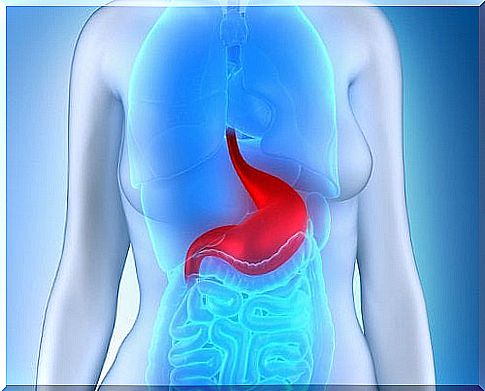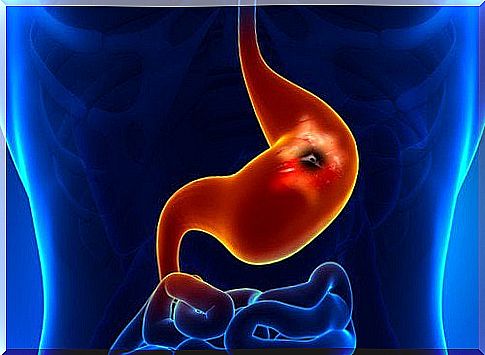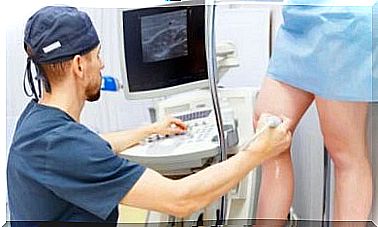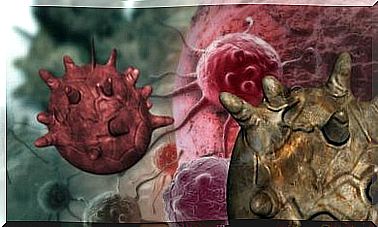Symptoms Of Gastroduodenal Ulcer

You have certainly heard of this condition which consists in the development of lesions in the stomach or duodenum. Ulcers can cause severe pain and usually occur during times of stress, although there are exceptions. Therefore, it is important to know the main symptoms of gastroduodenal ulcer.
What is gastroduodenal or peptic ulcer?
Ulcer is a common disease. It can develop as a result of an unhealthy lifestyle. Problems occur when certain lesions form in the gastric mucosa (stomach) or the lining of the small intestine (also called the duodenum).
These lesions or ulcerations occur when there is a sudden change in the digestive process. They can be caused, for example, by the secretion of too much gastric acid. You may be surprised to learn that, according to statistics, almost 20% of the world’s population suffers from this problem. Therefore, you must be very careful, because if not treated in time, gastroduodenal ulcer can cause serious complications.
What causes gastroduodenal ulcer?

- The most common cause of gastroduodenal ulcer is infection with the bacterium Helicobacter pylori. It is true that many people associate ulcers with stress and metabolic changes that alter the level of cortisol in the body, which leads to digestive problems. But you should know that this is not always the case – bacteria are generally the main cause of the development of ulcers.
- Do you usually take ibuprofen regularly to relieve pain? If so, be careful. High consumption of ibuprofen can alter the secretion of gastric acids, causing ulcers.
- Tobacco use is another trigger. If you have not yet quit smoking, you should now give up this harmful habit and put your health first. Deserve!
- Another cause is the regular consumption of alcohol and acidic or very spicy foods.
- Stress is also a factor worth considering, but, as we have already mentioned, it is not 100% to blame. And people who have low levels of stress and do not suffer from anxiety can get an ulcer.
Symptoms of gastroduodenal ulcer

In addition to pain and a general state of discomfort, the most common symptoms of gastroduodenal ulcer are acid reflux, which often leaves the impression of simple indigestion. You need to be aware that if you do not treat your ulcer, it will erode the walls of your stomach and small intestine, causing internal bleeding and affecting other adjacent organs, such as the pancreas.
Ulcer is a serious problem, so remember these symptoms and do not hesitate to see a doctor if you feel pain, discomfort or any other cause for concern. Here are the most common symptoms:
- Feeling too full. You barely ate and felt your stomach full and strong, as if you had eaten so much that you could barely breathe. If this happens to you often and not just from time to time, go to the doctor.
- Hiccups, belching and intestinal gas: Do you go through a long process after serving the meal that starts with hiccups, followed by uncontrollable roaring and, after a few hours, intestinal gas? You may have an ulcer.
- Abdominal pain: Pain or burning located in the abdominal area and around the navel, which does not respond to treatment, may be a sign of the presence of ulcer. If they do not go away in a week, it is advisable to see a doctor.
- Acute hunger sensation, manifested for short periods of time: When you suffer from peptic ulcer, you may have that feeling of too full a stomach for a few hours after a meal, and then suddenly feel hungry. It is, in fact, a false hunger, caused by excess stomach acid, which irritates the ulcer.
Symptoms of advanced gastroduodenal ulcer
- Nausea and weight loss: These are symptoms that appear in more advanced stages of the disease and should really be an alarm signal. No one loses weight for no reason. It is a clear sign that the body is not being properly nourished, which is why the digestive system is not working properly. If you also have nausea or vomiting, then the ulcer becomes an even more plausible diagnosis. Don’t think about it – go to the doctor right away!
- Vomiting with blood: These symptoms of gastroduodenal ulcer show that the disease has already eroded the gastric mucosa or walls of the duodenum. If this happens to you, go directly to the emergency hospital. Keep calm – you already know that the ulcer can be treated. With the right medications and the necessary changes in your diet and lifestyle, you can quickly improve the situation. The most important thing is to recognize the severity of the symptoms so that you can take action as soon as possible.









